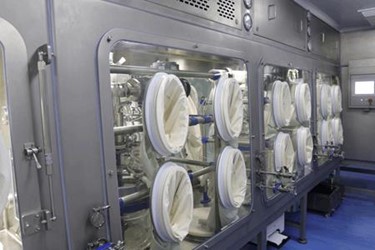Bigger Pharma Supports Biotech Outsourcing

By Louis Garguilo, Chief Editor, Outsourced Pharma

Michael Kaufman, Senior Vice President of CMC for Mersana Therapeutics, has a powerful weapon in his battle to combat supply-chain complexity: A collaborative pharma partnership with Takeda’s Millennium.
Kaufman recently explained how perhaps no supply chain is more complex than one for a fully outsourced antibody-drug conjugate (ADC) pipeline. Today we’ll look at how Takeda assists his organization in the contract development and manufacturing of Mersana’s drug candidates.
Mersana And Takeda Form Partnership
 Biotechs – from fully virtual to Big Bio with thousands of employees – enjoy their independence to create new therapies, platforms, and drugs. But that independence relies, perhaps paradoxically, on partnerships of all kinds. Indeed, relationships rule the drug development and manufacturing landscape today. Kaufman suggests taking full advantage of any of those tie-ups, and particularly if they are with experienced pharma partners who can help guide your external supply-chain decision-making.
Biotechs – from fully virtual to Big Bio with thousands of employees – enjoy their independence to create new therapies, platforms, and drugs. But that independence relies, perhaps paradoxically, on partnerships of all kinds. Indeed, relationships rule the drug development and manufacturing landscape today. Kaufman suggests taking full advantage of any of those tie-ups, and particularly if they are with experienced pharma partners who can help guide your external supply-chain decision-making.
“Yes, they did and do,” Kaufman eagerly replies when asked if his pharma partner directly assists in the selection and management of Mersana’s external partners. “To provide a little history,” he adds, “I actually led the pharmaceutical sciences group when I worked for quite a few years at Millennium (acquired by Takeda in 2008). A high degree of trust was built up over those years. We were very collaborative.”
Today, as Mersana’s research and development partner, Takeda receives full access to “all the selection data Mersana has collected on service providers, and in fact they come with us to visit CDMOs.” Kaufman adds, “Takeda is around the table when we ask questions. They are at the table after we leave the CDMOs and have our own debriefing sessions. It is as close as you can get to a seamless collaboration.”
Mersana actually has two specific relationships with Takeda. The first, for lead compound XMT1522 (a Dolaflexin ADC targeting HER2-expressing tumors), is “a collaboration in which Takeda is co-developing the molecule, and has commercialization rights in certain regions of the world.”
The second collaboration provides Takeda with access to Mersana’s Fleximer antibody drug conjugate platform, encompassing multiple therapeutic targets and potential drug candidates.
Separately, Mersana is also developing a second, phase-one drug – XMT 1536 (a Dolaflexin ADC targeting NaPi2b-expressing tumors) – and at least three other programs in its pipeline. More opportunity for drug development and helping patients, but also more complexity in supply-chain building and management.
So What’s A Bit More Complexity Matter?
Complexity, in fact, has its good side.
Mersana has purposefully decided on a strategy for “outsourcing partner diversity.” That means the company will not select the same contract developers and manufacturers for the compounds in its pipeline – even at times if the same CDMO can ably work with a number of the compounds.
“We made a conscious decision to diversify into having redundancy in our suppliers, and to bring on board additional ones for the next molecules,” explains Kaufman. “I love working with our current partners; these are strong relationships,” he says, “but we like to have other people who can also do certain steps in the development and manufacturing processes. It’s a supply-chain safety net. We’re trading off supply-chain complexity for security of supply.” Of course a partner like Takeda can help in that regard.
However, certain headwinds blowing through the contract development and manufacturing industry may inhibit Mersana’s ability to execute on that diversify of suppliers: namely, M&A within the CDMO ranks, and service providers in general looking to expand their offerings. In fact, Mersana, says Kaufman, may have to take a different tact at times, within its overall preference for seeking supplier diversification.
“There’s a technical complexity that goes with Mersana’s technology, and we’ve talked about the concept of the redundancy of supply,” says Kaufman. “When I first started here, a CDMO would specialize in the warhead, another one in the linker technology, one for the bioconjugation, the drug product, etcetera.
“But over the last couple of years,” he continues, “suppliers have been trying to integrate their services and production. They’re offering more of a one-stop shop. I have to say that’s a direction we’re starting to adjust to, and frankly move in, to take advantage of this evolution. So, we are trying to simplify some of that organic, and purposefully built-in, complexity in our business model.”
Kaufman pauses, and then continues with a laugh: “We don’t make things as complex as possible because we’re gluttons for punishment. It was just that very few CDMOs offered these integrated services, and now it’s becoming more common, and most importantly, more reliable.”
Readers of OutsourcedPharma.com will surely recognize this debate surrounding expanding service integration. (The most recent article tackling the subject: Comfortable CMO Consolidation And Biopharma Convergence.) But again, for the most part this can fall into the category of a “good dilemma.” But the dilemma– convenience of integrated service providers vs. redundancy and diversification for supply-chain integrity – remains an important consideration at biotechs developing cutting-edge platforms, technologies and drugs.
“Agreed,” concludes Kaufman. “But at least we have a choice these days. And name-brand service providers are stepping up to fill a need in the industry, suggesting greater reliability in the model. We’ll see where this takes us.” It won’t be surprising if one direction it takes Kaufman and Mersana is back to its pharma partner for guidance.
